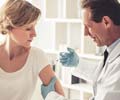- Measles is a highly infective, serious disease caused by a virus of the paramyxovirus family.
- Measles Immunization Day is observed on 16th of March to create awareness about the availability of vaccines to fight against the virus.
- Before the measles vaccine was introduced in 1963, an estimated 2.6 million deaths were reported every year due to the disease.
About Measles Immunization Day
Measles Immunization Day is celebrated on March 16 every year in India to increase awareness about the availability of the measles vaccine and the need to get individuals vaccinated to protect themselves from the highly contagious measles virus. In spite of the availability of a safe and effective vaccine, measles is one of the leading causes of deaths among young children. In 2016 approximately 89,780 people died from measles and most of them were children under the age of 5.Measles is highly contagious as it can be passed on through direct contact or nose droplets. The virus tends to infect the respiratory tract, then later spreads throughout the body.
Who Should Receive MMR Vaccine?
Children- According to the recommendation of Centers for Disease Control and Prevention (CDC), all children should get two doses of MMR (measles-mumps-rubella) vaccine.
- Starting with the first dose at 12 -15 months of age, and the second dose at 4- 6 years of age.
- Children can also receive the second dose earlier- but only 28 days after the first dose.
- They can also get an MMRV vaccine, which protects against measles, mumps, rubella, and varicella (chickenpox). This vaccine is licensed explicitly for children who are 12 months -12 years of age.
Kids who are not found to have immunity against the virus, need to get two doses of MMR vaccine, separated by at least 28 days.
Adults
Adults who are not found to have immunity should get at least one dose of MMR vaccine.
International Travelers
Babies 6 months of age and older who will be traveling internationally need to be protected against measles.
Before traveling:
- Infants 6 through 11 months of age should receive at least one dose of MMR vaccine.
- Infants who get one dose of the vaccine before their first birthday should get two more doses (one dose at 12-15 months of age and the other one separated by, at least 28 days).
- Children who are older than 12 months should get two doses of the vaccine separated by at least 28 days.
Health Care Personnel
Health care personnel who are found to have no trace of immunity against the virus should get two doses of , separated by at least 28 days.
How Effective is MMR Vaccine?
MMR vaccine is very effective in protecting against measles, mumps, and rubella virus and preventing the complications caused by these diseases.Individuals who received two doses of MMR vaccine as when they were kids are considered protected for life as per the U.S. vaccination schedule.
The two doses of MMR vaccine are found to be 97% effective against measles, 88% against mumps and even one dose is 97% effective against rubella.
Who Should Not Get Measles, Mumps, and Rubella (MMR) vaccine?
- People who are allergic to neomycin antibiotic or any other component of MMR vaccine.
- Women who are pregnant should not get MMR vaccine. They should wait until after giving birth. They should also avoid getting pregnant for four weeks after vaccination with MMR vaccine.
In India
Vaccines such as measles vaccines are given under the Universal Immunization Programme at 9-12 months of age and 2nd dose at 16-24 months of age.Facts
- Even though there is a safe and cost-effective vaccine available for measles, it is one of the leading causes of deaths among young children.
- In 2016, there were nearly 89,780 deaths due to measles virus.
- Increased implementation of Measles vaccination drive worldwide has resulted in an 84% drop in measles deaths between 2000 and 2016.
- In 2016, about 85 percent of world's children received one dose of measles vaccine by their first birthday through routine health services.
- In between 2000-2016, measles vaccination drive prevented an estimated 20.4 million deaths making measles vaccine one of the best buys in public health.
References:
- Measles Immunization Day - (https://www.nhp.gov.in/Measles-Immunization-Day_pg)
- Measles Vaccination - (https://www.cdc.gov/vaccines/vpd/measles/index.html)
- Measles - (http://www.who.int/mediacentre/factsheets/fs286/en/)
- Measles- Immunization, Vaccines and Biologicals - (http://www.who.int/immunization/diseases/measles/en/)
- Measles, Mumps, and Rubella (MMR) Vaccination: What Everyone Should Know - (https://www.cdc.gov/vaccines/vpd/mmr/public/index.html)












